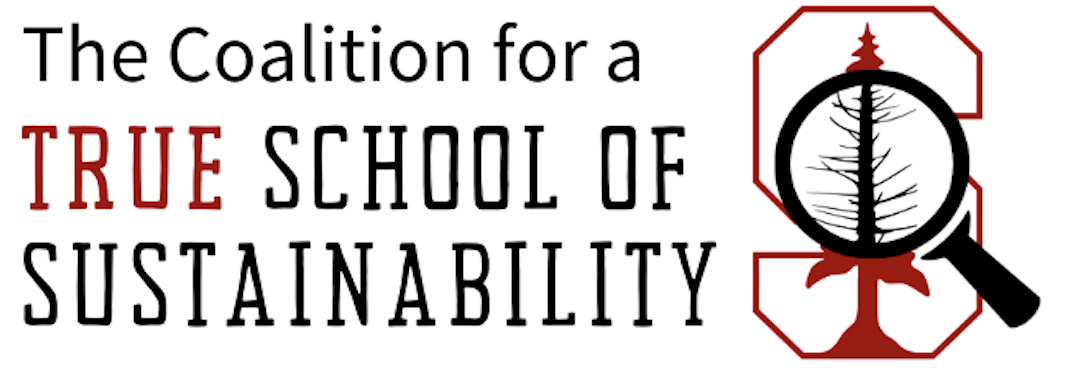Media coverage, op-eds, and background resources
Coverage of the Doerr School’s Entanglement with Fossil Fuels
-

'Don't Look Up' Director’s Nonprofit Roasts Stanford for Fossil Fuel Funding (Oct. 24, 2023)
The nonprofit founded by Adam McKay — writer and director of the popular climate film “Don’t Look Up” — has released a video lambasting Stanford University’s new climate school for its stance on accepting money from the fossil fuel industry. — KQED Public Radio
-

Stanford Doerr School of Sustainability (Wants Big Oil Money!) (Oct. 3, 2023)
A satirical “advertisement” for the Doerr School produced by Hollywood director Adam McKay’s climate satire media non profit — Yellow Dot Studios
-

What Would a True School of Sustainability Look Like? Rejecting Oil Money, for a Start (Sept. 28, 2023)
Amidst great fanfare, Stanford University created the Doerr School for Sustainability, which immediately said that it would accept funding from the fossil fuel industry. A group of students has pushed back, and built an impressive movement to dissociate from such funds. In this episode, we talk to some of the people leading the movement about what drives them and sustains them in building a True School of Sustainability — Speaking Out of Place Podcast
-

Is your university profiting from climate change? (May 16, 2023)
While many universities are proud to talk about how they fight climate change, some also invest in and accept donations from the same oil companies that drive global warming. Experts and students are calling those schools hypocritical and are demanding change — CBS
-
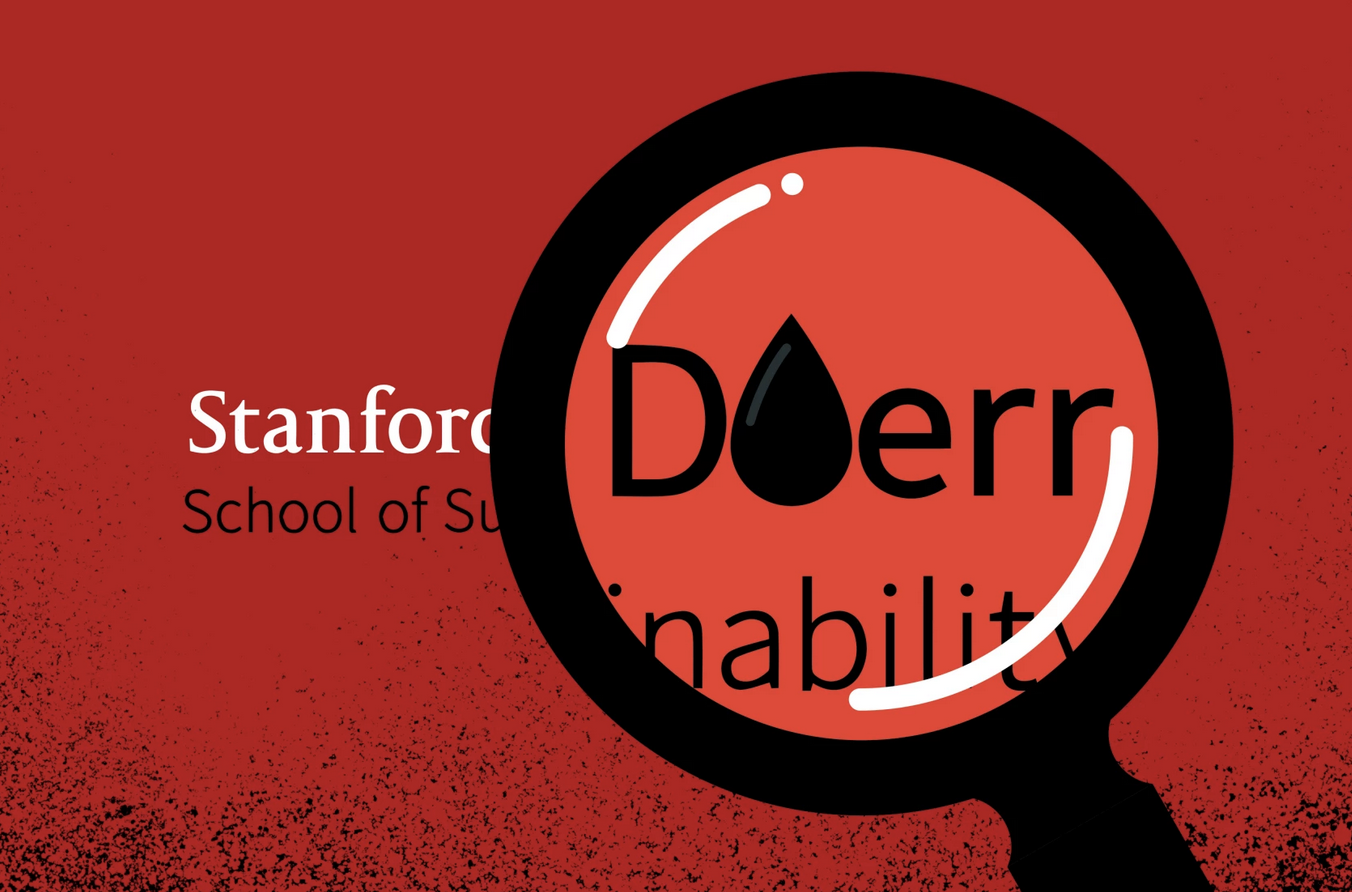
Big Oil Helped Shape Stanford’s Latest Climate-Research Focus (May 4, 2023)
The university’s sustainability school chose greenhouse-gas removal after input from fossil-fuel executives. Critics say the industry’s involvement is cause for concern — Chronicle of Higher Ed
-

Can ‘Dirty Money’ Pollute Climate Scholarship? (Dec. 2, 2022)
Stanford’s new Doerr School of Sustainability is under fire for accepting money from fossil fuel companies, igniting a debate about the influence of the industry on climate research —Inside Higher Ed
-

Exxon CEO visits Stanford plugging company’s plan for carbon neutrality, sparks protest (Nov. 3, 2022)
Students, faculty and outside activists affiliated with the Coalition for a True School of Sustainability protested Stanford’s inclusion of ExxonMobil Chairman and Chief Executive Officer Darren Woods as a guest speaker at the Global Energy Forum and the Doerr School of Sustainability’s acceptance of fossil fuel money — The Stanford Daily
-

When Divestment Isn’t Enough (Oct. 26, 2022)
A movement to get oil money out of academic research is taking shape on campuses — The Chronicle of Higher Education
-

Universities are still enabling Big Oil — but not without backlash (Oct. 25, 2022)
Students, faculty, and alumni want their institutions to cut off fossil fuels for real — ExxonKnews
-

Oil Money Undermines Academic Autonomy (Oct. 19, 2022)
Universities should ban fossil fuel industry funding for research on climate change and energy, Jake Lowe and Connor Chung write —Inside Higher Ed
-

Princeton Will Stop Taking Oil Money. Now the Pressure Is on Harvard, MIT, and Columbia (Oct. 12, 2022)
Princeton Will Stop Taking Oil Money. Now the Pressure Is on Harvard, MIT, and Columbia — The New Republic
-

Fossil-Fuel Money Is Warping Climate Research (Sept. 29, 2022)
Universities must require full funding disclosure —The Chronicle of Higher Education
-

Protesters knock Doerr, interrupting sustainability school’s opening ceremony (Sept. 30, 2022)
Advocates demanded the school reject funding from fossil fuel companies —The Stanford Daily
-

Fossil-Fuel Money Will Undermine Stanford’s New Sustainability School (Oct. 1, 2022)
Stanford University’s Doerr School of Sustainability will take energy industry donations, which will warp priorities and research agendas —Scientific American
-

Stealing from the tobacco playbook, fossil fuel companies pour money into elite American universities (Sept. 14, 2022)
Paul Thacker examines how oil and gas companies have funded research to try to weaken messages on climate change and protect their interests —The BMJ
-

Stanford School of Sustainability launches amid criticisms over fossil fuel funding (Sept. 5, 2022)
Stanford launched the Doerr School of Sustainability, the University’s new hub for research and innovation focused on advancing the long-term prosperity of the planet, on Thursday. The opening comes amid criticism about the school receiving funding from fossil fuel companies and over seventy years after Stanford launched its last new school, the School of Humanities and Sciences, in 1948. —Stanford Daily.
-

Will Stanford’s Doerr School of Sustainability be polluted by fossil-fuel money? (July 27, 2022)
Big Oil is a big backer of a new school devoted to sustainability. Are they leveraging the lessons learned by Big Tobacco? —GreenBiz
-

“Green” Universities Keep Taking Sweet, Sweet Oil Money (July 12, 2022)
Despite their supposed focus on sustainability, there seems to be an awful lot of fossil fuel and ‘big oil’ money creeping into university’s “green” programs. The main example they give is Stanford’s new Doerr School of Sustainability, but it’s far from the only place where these problematic conflicts of interest pop up in academia —CleanTechnica.
-

Stanford community critiques Sustainability School’s acceptance of fossil fuel funds, expresses optimism for opening (May 30, 2022)
The debate over Stanford’s relationship with fossil fuel companies has reached a fever pitch across campus —Stanford Daily.
-

A feud over fossil fuel money (May 24, 2022)
Some faculty and students at Stanford want the university to reject industry donations. It’s the latest clash in a wider battle over whether to shun oil and gas money —New York Times. Full article
-

Who is Arun Majumdar? (May 22, 2022)
Incoming Sustainability School dean has a history of embracing industry partnerships —Stanford Daily.
-

GSC approves voting members, urges Sustainability School to refuse fossil fuel funding (May 19, 2022)
The Graduate Student Council (GSC) certified the election of all 15 voting members to the 2022-23 council and endorsed a letter calling on the Doerr School of Sustainability to refuse funding from fossil fuel companies during its Wednesday meeting —Stanford Daily.
Background: Peer-reviewed Papers evaluating influence of industry funding and fossil fuel industry rhetoric and disinformation
-

The Influence of Industry Sponsorship on the Research Agenda: A Scoping Review (Oct 10, 2018)
The influence on the research agenda has given the industry the potential to affect policymaking by influencing the type of evidence that is available and the kinds of public health solutions considered. The results of our scoping review support the need to develop strategies to counteract corporate influence on the research agenda. Peer-reviewed paper
-

Favourability towards natural gas relates to funding source of university energy centres (Nov 10, 2022)
We found that fossil-funded centres are more favourable in their reports towards natural gas than towards renewable energy, and tweets are more favourable when they mention funders by name. Centres less dependent on fossil funding show a reversed pattern with more neutral sentiment towards gas, and favour solar and hydro power. Peer-reviewed paper
-

Industry sponsorship and research outcome: systematic review with meta-analysis (Aug 21, 2018)
We included 27 additional papers in this update (review now includes 75 papers). Industry sponsored studies more often had favorable efficacy results, RR: 1.27 (95% CI 1.17–1.37), no difference in harms results RR: 1.37 (95% CI 0.64–2.93) and more often favorable conclusions RR: 1.34 (95% CI 1.19–1.51) compared with non-industry sponsored studies. Peer-reviewed paper
-

Weaponizing economics: Big Oil, economic consultants, and climate policy delay (Aug 25, 2021)
The role of particular scientists in opposing policies to slow and halt global warming has been extensively documented. The role of economists, however, has received less attention. Here, I trace the history of an influential group of economic consultants hired by the petroleum industry from the 1990s to the 2010s to estimate the costs of various proposed climate policies. Peer-reviewed paper
-

Discourses of climate delay (Jul 1, 2020)
Discourses of climate delay’ pervade current debates on climate action. These discourses accept the existence of climate change, but justify inaction or inadequate efforts. In contemporary discussions on what actions should be taken, by whom and how fast, proponents of climate delay would argue for minimal action or action taken by others. They focus attention on the negative social effects of climate policies and raise doubt that mitigation is possible. Here, we outline the common features of climate delay discourses and provide a guide to identifying them. Peer-reviewed paper
-

Assessing ExxonMobil’s global warming projections (Jan 13, 2023)
For decades, some members of the fossil fuel industry tried to convince the public that a causative link between fossil fuel use and climate warming could not be made because the models used to project warming were too uncertain. Supran et al. show that one of those fossil fuel companies, ExxonMobil, had their own internal models that projected warming trajectories consistent with those forecast by the independent academic and government models. What they understood about climate models thus contradicted what they led the public to believe, Science. Peer-reviewed paper
-

The clean energy claims of BP, Chevron, ExxonMobil and Shell: A mismatch between discourse, actions and investments (Feb 16, 2022)
Recently, several majors are increasingly discussing clean energy and climate change, pledging decarbonization strategies, and investing in alternative energies. Some even claim to be transforming into clean energy companies. Given a history of obstructive climate actions and “greenwashing”, there is a need to objectively evaluate current and historical decarbonization efforts and investment behavior. This study focuses on two American (Chevron, ExxonMobil) and two European majors (BP, Shell). Peer-reviewed paper
-

Unextractable fossil fuels in a 1.5 °C world (Sep 8, 2021)
Here we use a global energy systems model8 to assess the amount of fossil fuels that would need to be left in the ground, regionally and globally, to allow for a 50 per cent probability of limiting warming to 1.5 °C. By 2050, we find that nearly 60 per cent of oil and fossil methane gas, and 90 per cent of coal must remain unextracted to keep within a 1.5 °C carbon budget. This is a large increase in the unextractable estimates for a 2 °C carbon budget, particularly for oil, for which an additional 25 per cent of reserves must remain unextracted. Peer-reviewed paper
-

Evaluating fossil fuel companies’ alignment with 1.5 °C climate pathways (Aug 14, 2023)
…We evaluated the 142 largest producers of coal, oil and gas against three 1.5 °C IPCC Shared Socio-economic Pathways (SSP1-1.9, SSP2-1.9 and SSP5-1.9) from 2014 and the International Energy Agency’s Net Zero Emissions pathway from 2020. Between 2014 and 2020, 64%, 63% and 70% of coal, oil and gas companies, respectively, produced more than their production budgets under the IPCC’s middle-of-the-road (SSP2-1.9) Paris Agreement-compliant scenario. In addition, if the 142 companies we examined continued their average growth rate trends from 2010 to 2018, they would produce up to 68%, 42% and 53% more than their cumulative production budgets for coal, oil and gas, respectively, by 2050. By providing such simple metrics, based on publicly available data, our method offers stakeholders a way of easily tracking and comparing the performance of different fossil fuel producers against climate goals. Peer-reviewed paper
-

How ambitious are oil and gas companies’ climate goals? (Oct 21, 2021)
In this paper, we present a forward-looking method of estimating the life-cycle carbon emissions intensity of O&G producers based on their public disclosures, and we use it to compare companies’ targets with international climate goals. The sector is not on track. Recent trends in emissions intensity have been mostly flat. Nearly half the companies we assess have yet to set emissions targets or provide sufficient clarity on them. Of those that have set targets, most are either too shallow or too narrow. Two companies have set targets that would bring their GHG intensity below international climate goals by mid-century. Peer-reviewed paper
-

Early oil disinformation on global warming (Jan 5, 2021)
Determining the onset of organized disinformation about global warming is critical for understanding its political history and evaluating the responsibilities of fossil fuel producers and other relevant parties today. A newly discovered archival document shows the American Petroleum Institute was promulgating false and misleading information about climate change in 1980, nearly a decade earlier than previously known, in order to promote public policies favorable to the fossil fuel industry. This finding demonstrates early use of public-facing disinformation about global warming by the petroleum industry and suggests commercial fossil fuel interests played a more obstructive role in climate change discourse and policy throughout the 1980s than previously understood. Peer-reviewed paper
-

Early oil industry knowledge of CO2 and global warming (Nov 19, 2018)
“…in 1959, petroleum industry leaders were notified of the danger of CO2 accumulation by the physicist Edward Teller, who warned them of global temperature and sea-level rise by the end of the century. Thus, even before early portions of the Keeling curve were published in 1960, leaders of the API and other segments of the oil industry were informed that fossil fuel products were causing atmospheric CO2 concentrations to rise, and that such a rise was potentially dangerous.” Peer-reviewed paper
Op-Eds
-
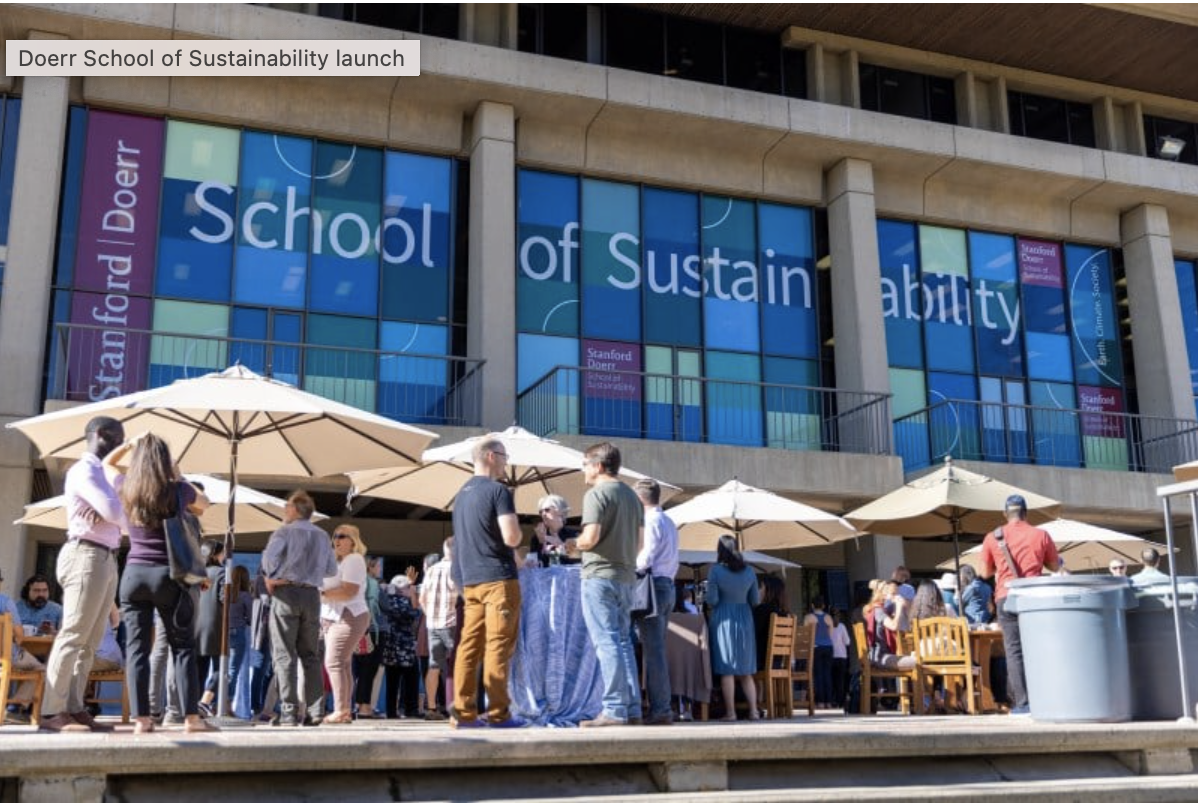
Across diverse backgrounds, we are more aligned on how to approach Stanford’s fossil fuel engagement than you might think (Oct. 5, 2023)
A group of six graduate researchers with diverse opinions on fossil fuel companies’ role in funding Stanford research reached a consensus on criteria for evaluating the sources and objectives of research funding, as well as actions for enforcing these criteria — Stanford Daily
-

Doerr School confuses wealth and fame for leadership and knowledge (Jun. 7, 2023)
It is shockingly credulous to allow those who have financed or supported oil wars, anti-competitive rents and science denial to advise us on how to solve many of the problems they exacerbated. As Anand Giridharadas points out in his book Winners Take All: The Elite Charade of Changing the World, it is like assuming that “arsonists make the best firefighters.” — Stanford Daily
-
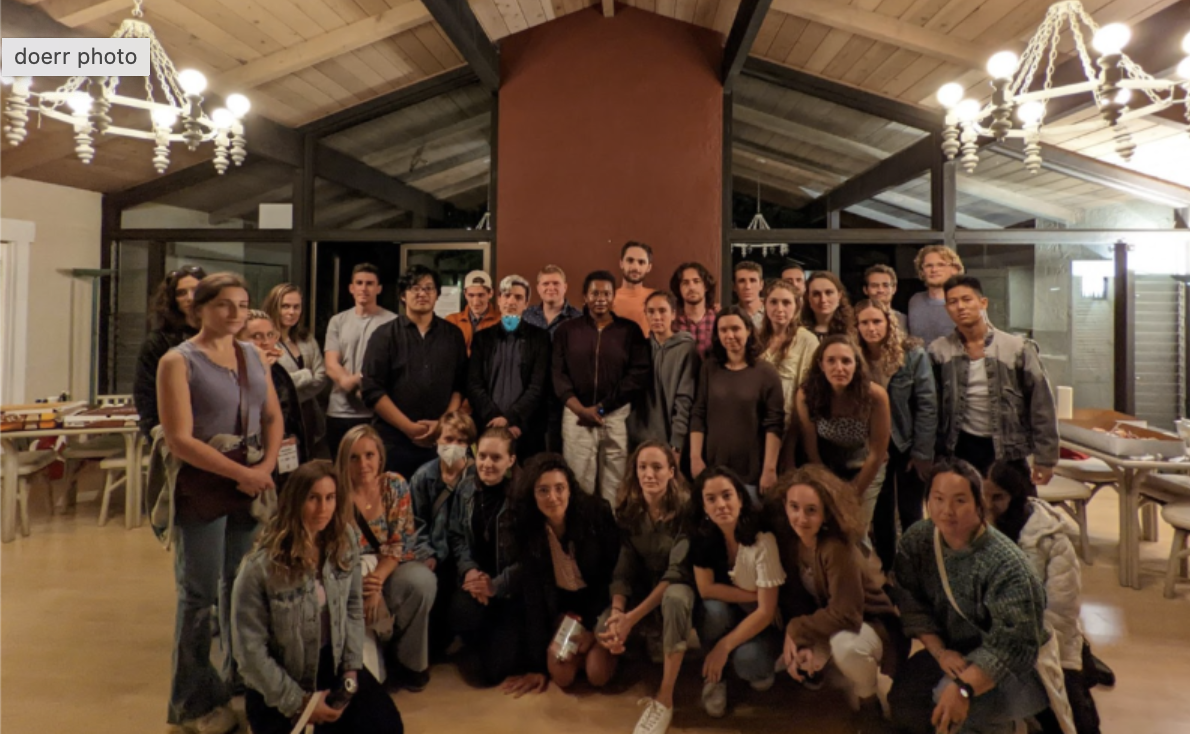
We remember our pledge: No donations without divestment and dissociation (Nov. 30, 2022)
osh De Leon, Maria Doerr, Josh Lappen, and Sarah Brickman argue for students to continue to push Stanford to divest from fossil fuels —Stanford Daily
-

Students Tell Their Universities: Keep Fossil Fuel Companies Out of Climate Research (Nov. 22, 2022)
Amid COP27, members of the Fossil Free Research movement took action around the world, protesting the influence of Big Oil on crucial climate change studies —The Nation
-

We can’t afford business as usual (Oct. 3, 2022)
Doerr and Stanford have a choice — will they be willing partners with the oil industry, accepting their well-documented misinformation as fact and their money as clean? Or will they try the Princeton model, and be financially and intellectually independent? —Stanford Daily
-

Imagining a different future for the Doerr School (Sept. 27, 2022)
Here we summarize why the Doerr School’s relationship with the fossil fuel industry is damaging to our university’s reputation, values, and research integrity, and invite the Stanford community to imagine a different future for the Doerr School —Stanford Daily
-

To Confront the Climate Crisis, Universities Must Refuse Fossil Fuel Industry Funding (Sept. 27, 2022)
Every research dollar, lab hour, and project report that is beholden to or biased by fossil fuel industry influence is a missed opportunity to address the climate crisis —Common Dreams
-

We deserve a transparent process for a true School of Sustainability (Aug 7, 2022)
A siloed and closed-door decision-making process is vulnerable to special interest groups and short-sighted decisions that will forego deeper inquiry and deliberation on how we might build a new school that benefits the broader global community and generations to come. Given the long-term impact of these decisions, we urge Dean Majumdar and the Doerr School leadership to shape the school in a truly transparent and democratic manner. —Stanford Daily
-

School of Sustainability’s leadership must reinvest in environmental justice and a fossil-free future (Jun 22, 2022)
For years, Stanford leadership has gestured toward an interest in environmental justice (EJ). This December, university leaders took an important step in launching the EJ Cluster Hire — originally proposed by the Stanford EJ Working Group in 2018 and widely supported by the Stanford community. The goal is to fill a glaring gap: despite environmental justice being necessary to achieving a sustainable society, we have no environmental justice scholars on the Academic Council Stanford faculty —Stanford Daily.
-

Stanford's New School of Sustainability Is a Gift to Fossil Fuel Companies (Jun 21, 2022)
The university seems set to replicate the mistakes of past climate research: soliciting oil and gas funding while paying lip service to environmental justice —The Nation.
-

Should any fossil-fuel company qualify for funding Stanford’s School of Sustainability? A response to Dean Majumdar’s letter (Jun 2, 2022)
Thom Hersbach argues that under Dean Majumdar’s four-part test, no fossil fuel company qualifies to fund Stanford’s School of Sustainability. “For now, accepting funding from fossil fuel companies at the institutional level should be a non-starter if Dean Majumdar and the Board intend to follow their own guidelines,” Hersbach writes —Stanford Daily.
-

Environmental justice must be foundational to the new School of Sustainability (Jan 27, 2021)
To advance environmental justice leadership, Stanford requires institutional structures and resources to support EJ research, teaching, communication, and community building in the new school —Stanford Daily.
-

Reject fossil fuel donations (May 29, 2022)
Over the years these companies have provided considerable financial support to different programs at Stanford, which has been valuable to the school, faculty members and students. For that support, the companies have gained access to extremely talented research scientists and engineers and first chance at hiring Stanford’s top students. By being associated with Stanford’s top-flight research programs, these companies have also received good publicity and burnished their reputation for innovation. All these benefits have come at a very cost-effective price to them —Stanford Daily.
-

Stanford has a chance at a real School of Sustainability — if it refuses fossil fuel meddling (May 12, 2022)
Accepting money from fossil fuel interests, even those claiming to diversify their portfolios, fundamentally undermines the school’s core learning competencies, tarnishes its academic reputation and hampers its stated mission of “solving the most complex problems in climate and sustainability” —Stanford Daily.
-
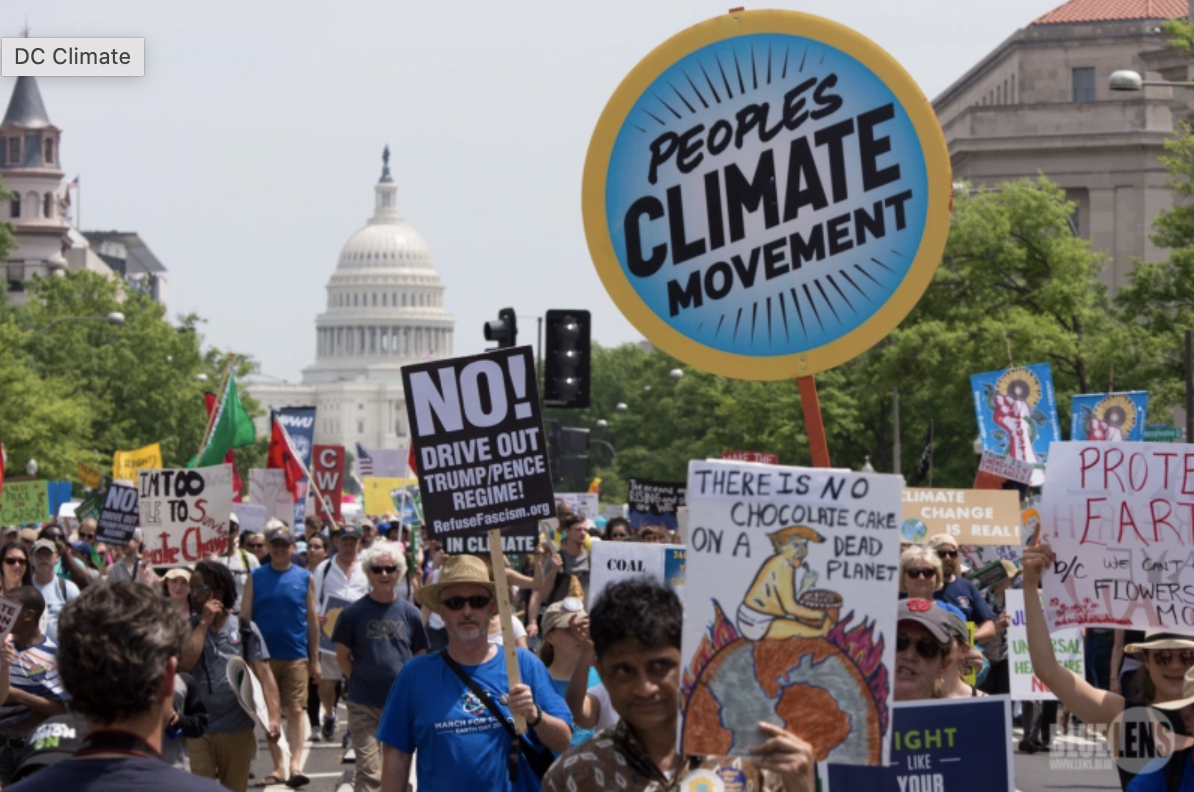
Open letter: Doerr School of Sustainability should cut ties with the fossil fuel industry (May 18, 2022)
Stanford’s decision to maintain its ties to the fossil fuel industry is incompatible with the new school’s focus on actionable solutions to address climate change. Let’s be clear: fossil fuel companies’ contributions to universities such as Stanford are not only philanthropic. These donations are part of a carefully crafted smokescreen, one that disguises their role in a crisis they’re perpetuating, one that helps them gain false legitimacy, and one that wins them influence on climate change-related research —Stanford Daily.
Background articles, websites, and reports
-

Study touting hydrogen — a technology favored by gas firms — was funded by gas interests, e-mails show (Nov 17, 2022)
A study by researchers at UMass Lowell on hydrogen’s potential seemed innocuous enough. But hundreds of pages of e-mail correspondence now raise questions about the influence the gas industry may have had on the report. Full article
-

Kicking oil companies out of school (Aug 16, 2022)
Faculty and staff at Cambridge are planning a vote that would require the university to stop accepting fossil fuel money for research. It’s part of an expanding movement. Full article
-

Voters Agree: Fossil Fuel Funding in Climate Research Presents Conflict of Interest (July 14, 2022)
Most likely voters agree with the statement “Colleges and universities studying the impacts of climate change and sustainability should refuse donations from fossil fuel companies so they can remain unbiased in their research.” Full article
-

Universities must reject fossil fuel cash for climate research, say academics (Mar 21, 2022)
Open letter from 500 academics likens fossil-energy funding of climate solutions to tobacco industry disinformation. Full article
-

The Pernicious Influence of Big Oil on America’s Universities (Jun 8, 2020)
Stanford’s divestment debate shows how effective fossil fuel companies have been at colonizing academia. Full article
-

Environmental Justice Working Group at Stanford
The Environmental Justice Working Group has been the home for meaningful EJ on campus while the administration continues to miss its mark on EJ. Read more on the EJWG website.
-

Revealed: the ‘carbon bombs’ set to trigger catastrophic climate breakdown (May 11, 2022)
Exclusive: Oil and gas majors are planning scores of vast projects that threaten to shatter the 1.5C climate goal. If governments do not act, these firms will continue to cash in as the world burns. Full article
-

Big Oil Reality Check (May 2022)
Ultimately, no major oil and gas company considered in this analysis comes anywhere close to the bare minimum for alignment with the Paris Agreement. The companies that have collectively done the most to fuel the climate crisis cannot be trusted to confront it meaningfully. Both public- and private-sector decision-makers must take action both to destroy the demand for fossil fuels and to choke off their production. Governments and the financial sector each have key roles to play. Full report
-

Shell and Exxon's secret 1980s climate change warnings (Sep 19, 2018)
Newly found documents from the 1980s show that fossil fuel companies privately predicted the global damage that would be caused by their products. Full article
